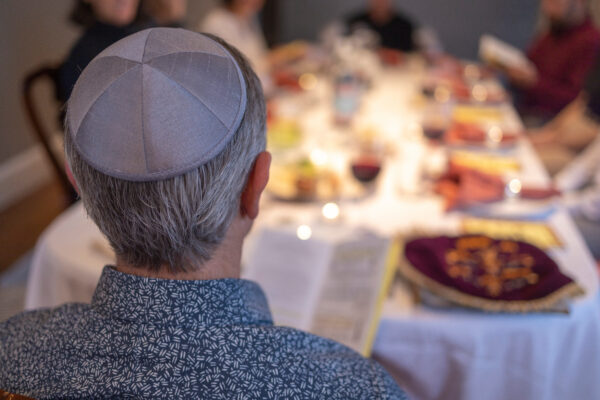
This coming Monday night Jews around the world will gather in our homes for the Pesach seder. The seder connects the master story of the Jewish people, the redemption from slavery in Egypt, to Jews throughout the generations.
We read in the Haggadah,
בְּכָל־דּוֹר וָדוֹר חַיָּב אָדָם לִרְאוֹת אֶת־עַצְמוֹ כְּאִלּוּ הוּא יָצָא מִמִּצְרַיִם
In each and every generation, a person is obligated to see themselves as if they left Egypt.
And the seder includes rituals that bring us back into the Exodus story. We eat bitter foods to have the bad taste of oppression in our mouths. We recline at our meals to feel the peace and relaxation available to those living in freedom and safety.
At the same time as we project ourselves into the Exodus of ancient Israel, the seder also brings that experience of slavery and redemption into our current experiences. Reenacting the biblical narrative reminds us that, throughout Jewish history, reality frequently stands in stark contrast to the joyous redemption celebrated at the seder. Jews have all too often obviously not been redeemed – facing exile, oppression, and hatred.
So, the Haggadah also includes portions that look to the next redemption, the need for protection from current threats to the Jewish people. For example…
וְהִיא שֶׁעָמְדָה לַאֲבוֹתֵינוּ וְלָנוּ. שֶׁלֹּא אֶחָד בִּלְבָד עָמַד עָלֵינוּ לְכַלּוֹתֵנוּ, אֶלָּא שֶׁבְּכָל דּוֹר וָדוֹר עוֹמְדִים עָלֵינוּ לְכַלוֹתֵנוּ, וְהַקָּדוֹשׁ בָּרוּךְ הוּא מַצִּילֵנוּ מִיָּדָם.
And it is this [promise that God made] that has stood for our ancestors and for us; since it is not [only] one [person or nation] that has stood [against] us to destroy us, but rather in each generation, they stand [against] us to destroy us, but the Holy One, blessed be He, rescues us from their hand.
In each generation they stand against us to destroy us. The seder is both a remembrance of our people’s origin and a prayer, a call for God to protect us again, now. These past six months, and definitely this past Shabbat, physical threats have been very real. I suspect that many of you were like me, holding our collective breaths Shabbat afternoon as the missiles and drones hurtled towards Israel, praying for our friends and family in Israel huddled in their safe rooms.
Today, with Israel at war and antisemitism seemingly all around us, the need for the seder’s next redemption, protection from current threats, is especially pertinent to our generation.
The Haggadah includes varied emotional responses to living in this reality, this cross-generational need to pray for physical protection.
One response is anger. After the seder meal we read three biblical verses…
שְׁפֹךְ חֲמָתְךָ אֶל־הַגּוֹיִם אֲשֶׁר לֹא יְדָעוּךָ וְעַל־מַמְלָכוֹת אֲשֶׁר בְּשִׁמְךָ לֹא קָרָאוּ. כִּי אָכַל אֶת־יַעֲקֹב וְאֶת־נָוֵהוּ הֵשַׁמּוּ. שְׁפָךְ־עֲלֵיהֶם זַעֲמֶךָ וַחֲרוֹן אַפְּךָ יַשִּׂיגֵם. תִּרְדֹף בְּאַף וְתַשְׁמִידֵם מִתַּחַת שְׁמֵי ה’.
Pour your wrath upon the nations that did not know You and upon the kingdoms that did not call upon Your Name! Since they have consumed Ya’akov and laid waste his habitation (Psalms 79:6-7). Pour out Your fury upon them and the fierceness of Your anger shall reach them (Psalms 69:25)! You shall pursue them with anger and eradicate them from under the skies of the Lord (Lamentations 3:66).
This expression of anger, calling for fury to be poured on enemies, is surely natural. In the days after October 7, I admit that I have felt a lot of anger. The murderers who did this, who “consumed Ya’akov and laid waste his habitation” deserve justice, and I felt the impulse to pray for them to be “eradicated from under the skies of the Lord.”
But as is so often the case in Jewish tradition, the Haggadah is multi-vocal, and includes another emotional response, compassion. It is a widespread practice to remove a drop of wine from our wine glasses when reciting each of the ten plagues that God brought on the Egyptians. There are various explanations for doing this. A well-known understanding of this practice is articulated by Rabbi Jonathan Sachs, who follows the 15th century Portuguese Rabbi Isaac ben Judah Abarbanel.
Rabbi Sachs wrote that removing the drops of wine should be “interpreted in accordance with the verse in Proverbs, “Do not rejoice when your enemy falls” (24:17). Even as we give thanks for the miracle of the plagues, as a result of which our ancestors gained their freedom, we also shed a symbolic tear for those who suffered… Moral maturity involves an ability to live with complex situations and emotions. We may be uplifted by an event because it represents the triumph of justice, while at the same time identifying with the suffering of the victims.”
Compassion for those suffering is a key lesson of the Exodus story. God implores the Israelites over and over again – don’t oppress other people, because you know what it is like to be oppressed. Caring for the vulnerable is central to our people’s origin and to our religious tradition. And today, even as I know that Israel must continue to wage war against those who aim to destroy it, I feel heartbroken for the many innocent lives that have been taken in the process.
The Haggadah includes space for us to feel both anger and compassion, and I find that reassuring. Our people have been facing these struggles for millennia and have provided us with a heritage filled with wisdom, that I think helps us as we face these physical and emotional challenges.
So, at the Seder next week, while I will say the prayers for God’s protection, I am also so grateful to live in an era of Jewish history when there is a Jewish State, protected by an army, to work alongside God to protect our people – to shoot the missiles out of the sky and keep us safe. And I am also thankful to live in Greater MetroWest, where there is a well-organized Jewish community here in NJ, a Jewish Federation, to keep us secure, and care for the vulnerable, and support each other in difficult times.
May our efforts, here at the Jewish Federation of Greater MetroWest NJ, and the efforts of Jews in Israel and around the world, succeed in strengthening the Jewish people for generations to come. And may our Seder prayers be answered, for a time soon when we see the next redemption, a time of peace for Israel and the entire world. May it be God’s will. כן יהי רצון

